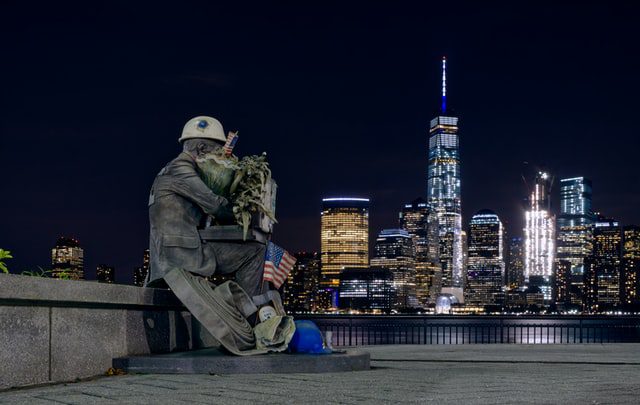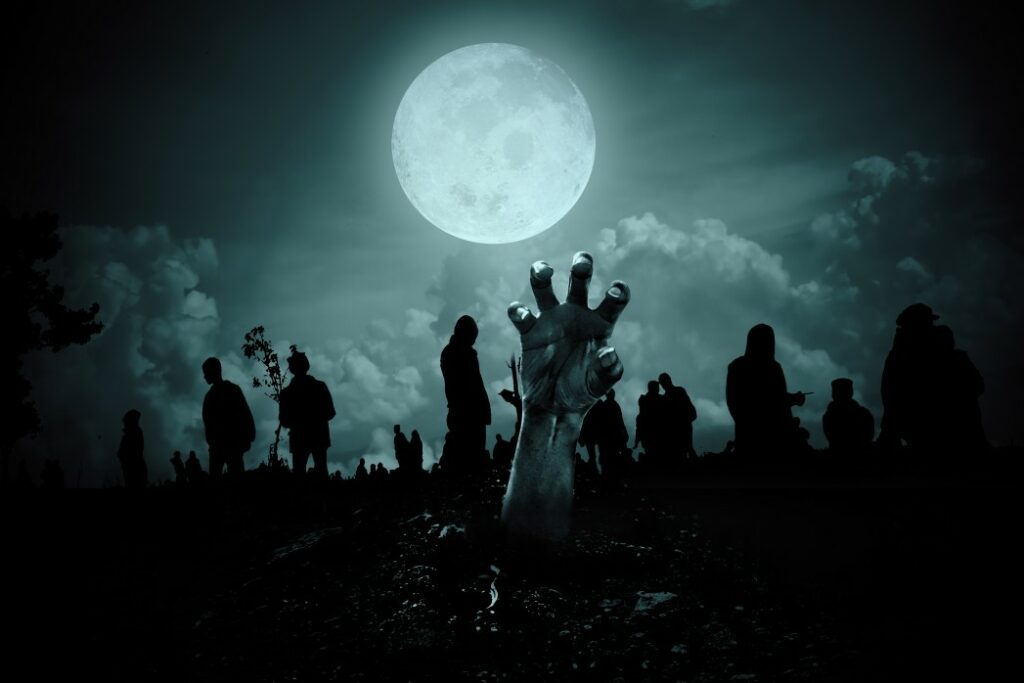Are you preparing for a zombie apocalypse, seriously?
Imagining the unthinkable
Why You Should Care
If you base your planning on past events, you end up fighting the last war, not the next one.
But, how can HR prepare to deal with the unknown?
The advantage of extreme fiction over traditional incident war gaming is that participants have no preconceptions or fixed ideas.
We seem to be facing a stream of events that take us completely by surprise.
These require smart, creative leadership and fast-acting responses. But it can be difficult to come up with a solution to something that you have never seen before. Within weeks the Covid-19 pandemic brought society to a grinding halt.
This is something that most of us could never have imagined. The terrorist attack on the World Trade Center in 2001 was also described as an example of a ‘failure of imagination. Do we have to wait until these events unfold before we can think about how to prepare and respond?

We can look at past events (Deepwater Horizon, SARS, MERS, Ebola, hurricane Katrina), and learn lessons on how to prepare from those. This is helpful if future events are similar. But what if some ‘low probability – extremely high impact’ events are not even on the risk matrix, because the chance of them happening is so low, or we have failed to imagine them in the first place? As the saying goes, if you base your planning on past events, you end up fighting the last war, not the next one.
How can we predict the unpredictable? Well before 9/11, the possibility of a suicide hijacking was imagined, by U.S. counter-terrorism adviser Richard A. Clarke, whose thinking was inspired by Tom Clancy’s novels, not by government intelligence sources. As if predicting Covid-19, in his 1981 novel, The Eyes of Darkness, Dean Koontz tells a story about an engineered pathogen, ‘Wuhan-400’. Sales of The Plague, by Albert Camus have recently soared. The novel, Station Eleven, by Emily St. John Mandel, is also about a killer flu pandemic.

These examples may explain why, after 9/11, the security community turned to fiction for new ideas. Anthony Cordesman, a U.S. national security analyst, offers a frightening account of the possibilities for novel terrorist and state actor attacks using biological and radiological weapons. His catalogue of potential threats is based on ‘The Buffy Paradigm’, after the ever changing and unpredictable threats faced by the heroine in the television series, Buffy the Vampire Slayer. Do you want to know how World War III could begin accidentally? Read the terrifyingly plausible novel by Jeffrey Lewis, The 2020 Commission Report on the North Korean Nuclear Attacks Against The United States.
Extreme fiction allows us to explore new ways of leading and organizing ourselves
This also explains why we are working with emergency services in Sweden to develop high impact development programs based on extreme fiction. These organizations deal with a mix of familiar and unpredictable threats, and they are critical to society’s resilience.
But how can we prepare to deal with the unknown?
Traditional development approaches involve studies of past events and war-gaming responses to similar worst-case scenarios. This is valuable, particularly as many extreme events follow similar patterns. However, recent experience suggests that we need to go beyond these methods, to explore unimaginable future scenarios, and to explore wholly innovative responses. Extreme fiction allows us to explore new ways of preparing, leading and organizing ourselves. This also expands the toolkit of responses to known emergencies.

Zombie movies and television series are particularly extreme, especially for a management development context. We have based our work on two sources. The classic zombie movie Day of the Dead (1985) illustrates different leadership configurations as the plot unfolds. This turns out to be a setting where traditional, directive ‘command and control’ crisis leadership is inappropriate, and in this case is fatal. The television series The Walking Dead (2010-2019) demonstrates how the properties of extreme contexts, and the nature of the survivor groups, bring out the ‘dark side’ of human behaviour.
Who would think that flesh-eating zombies could prove useful in this context?
This is not a setting where everyone pulls together in harmony, but leads to extreme between-group and within-group violence. We saw evidence for the dark side during the Covid-19 pandemic, with people fighting for toilet rolls, higher gun sales, selfish stockpiling, looting, people coughing on others to infect them, special shopping hours for healthcare workers sabotaged by other shoppers, borders closing, and blaming other (ethnic) groups.
Who would think that flesh-eating zombies could prove useful in this context? We are not alone in recruiting zombies as a development resource. The Sutter Roseville Medical Center in California has a zombie apocalypse drill. The U.S. Department of Health Centers for Disease Control and Prevention has an online guide for dealing with the living dead. The United States Strategic Command (2011) uses a training exercise, Counter-Zombie Dominance Operations, to stimulate creative thinking and develop disaster preparedness. Preparing for a fictional attack can help to develop guidelines for dealing with real disasters.

The advantage of extreme fiction over traditional incident wargaming is that participants have no preconceptions or fixed ideas – because this is a setting that nobody has experienced. Participants in traditional exercises complain about the settings they are asked to consider because ‘this is not realistic’. But as one senior manager noted with regard to our use of the zombie genre, that complaint can’t arise because the scenario is so unrealistic to begin with. The zombie genre is thus not useful because it depicts ‘reality’, but because it gives us ideas about human responses in settings that we have yet to see in real life. It alerts us to vulnerabilities that we may have never imagined. And it helps us to develop strategies for dealing with the unpredictable.
We work towards these outcomes using our six-dimension LOGICS model, which incorporates:
Leadership who will take charge?
Different leadership patterns – directive, distributed, self-managing – are appropriate in different settings; there is no one best form of crisis leadership and the symbol of the strong leader may be just that, a symbol.
Organization how should we organize?
People and other critical resources need to be deployed effectively, given the situation – but the organization must prepare to be flexible in the face of evolving threats. Similar to changing leadership, the organization may also have to adapt to circumstances.
Goals what are we trying to achieve?
The goals of those involved in an extreme situation are not always consistent with each other and people act with different intentions. This is a source of heightened emotions that lead to conflict if resolution is not achieved. As it turns out, we may be our own worst enemies.
Information how will we develop our understanding of what is happening?
Knowledge of events in fast-moving extreme contexts is always partial, fragmented, and potentially inaccurate; information sharing is vital, information hoarding can be fatal.
Continuity what is our exit strategy for the return to ‘normal’?
In the face of unstable multidimensional threats, we need to put in place a package of responses, with the twin aims of restoring continuity, and reducing future vulnerabilities.
Situatedness what is particular about this context and how will we adapt?
The correct answer is ‘it depends’. The context will always determine the appropriate response, and actions have to be considered in the light of this – not in hindsight.
These six factors do not cover all of the issues that will arise in an extreme context. But this gives us a structured framework with which to begin discussion. Zombie movies and television programs do not pretend to predict future extreme scenarios. We are not concerned to ‘learn the lessons’ from these stories. Our aims are more ambitious:
- to stimulate the imagination
- to shatter complacency – that something like this could never happen
- to heighten awareness of our vulnerabilities
- to develop creative responses and workable solutions
- to increase our creative capacity
- to make us more comfortable with uncertainty
- and above all, to reduce response times when the unpredictable happens.
The more extreme the extreme fiction, the more valuable it is in helping us to reach those aims.
About the research
Markus Hällgren and David Buchanan are team members at the Triple E.D. research programme -Extreme Environments, Everyday Decisions – based at Umeå University School of Business, Economics and Statistics, Sweden (www.tripleed.com). Publications from this work can be found in the journals Management Learning and Academy of Management Perspectives (forthcoming).
Sign up to the UNLEASH Newsletter
Get the Editor’s picks of the week delivered straight to your inbox!

-
Topics
COVID-19
Future of Work
Contact Us
"*" indicates required fields
Partner with UNLEASH
"*" indicates required fields